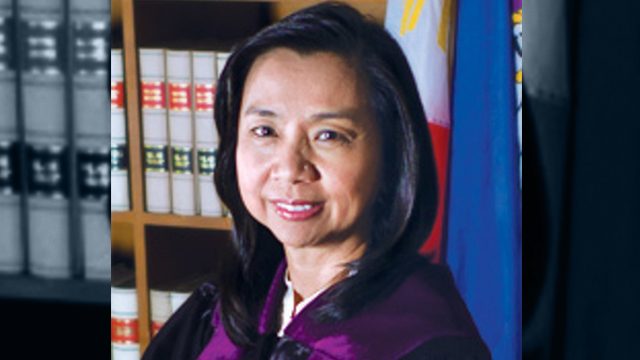SUMMARY
This is AI generated summarization, which may have errors. For context, always refer to the full article.

MANILA, Philippines (3rd UPDATE) – Supreme Court Associate Justice Estela Perlas Bernabe has accepted her nomination to become chief justice.
Justice Secretary Menardo Guevarra confirmed this to Rappler on Tuesday, August 20.
Bernabe will apply to replace Chief Justice Lucas Bersamin who will retire on October 18.
Guevarra said Associate Justices Diosdado Peralta and Andres Reyes Jr also accepted their nominations.
Before the 4:30 pm deadline on Tuesday, Associate Justice Jose Reyes Jr, currently no. 10 on the bench, also applied. Guevarra said he applied on his own.
Senior Associate Justice Antonio Carpio and Associate Justice Marvic Leonen declined their nominations.
Guevarra said that Associate Justice Benjamin Caguioa also declined his nomination. Carpio, Peralta, Bernabe, Leonen and Caguioa were automatically nominated as the 5 most senior justices. Andres Reyes Jr accepted his nomination from retired SC justice Jose Perez and retired CA justice Sesinando Villon.
The deadline of the Judicial and Bar Council (JBC) for applications and confirming or declining nominations is Tuesday.
Who is Justice Bernabe?
In a speech before new lawyers who were taking their oath in June, Bernabe stressed the importance of integrity.
“At the end of it all, always remember that in whatever opportunity you choose, your integrity is non-negotiable…. Never compromise your integrity” said Bernabe.
On the bench, Bernabe has broken stereotypes. She could not be easily categorized in a voting group. (READ: The unpredictability of Supreme Court Justice Bernabe)
Bernabe concurred in the decision that acquitted Gloria Macapagal Arroyo of plunder, and in the decision that gave a hero’s burial to the late dictator Ferdinand Marcos.
But she dissented to the decision that upheld the legality of Senator Leila de Lima’s arrest, and to the quo warranto ouster of former chief justice Maria Lourdes Sereno.
Her votes were also very nuanced. While she concurred in the decision that declared martial law in Mindanao as constitutional, she did not agree to the doctrine that those decisions established.
All 4 martial law decisions gave an unbridled discretion to the President to declare military rule. Bernabe disagreed, saying, “Our deference to the President must be circumscribed within the bounds of truth and reason.” (READ: Who voted for Duterte in the Supreme Court?)
Bernabe also broke the notion that career jurists tend to vote in favor of the bureaucracy.
Bernabe’s most most impactful ponencias, so far, went against this bureaucracy. This was when she penned the decision that declared the pork barrel system unconstitutional, in the decision that abandoned politicians’ favorite condonation doctrine.
Under the doctrine, which many elected officials had invoked since 1959, the administrative offenses of an elected official are already deemed forgiven when the public decides to re-elect him or her for another term.
Bernabe also voted against former president Benigno “Noynoy” Aquino III, who had appointed her, when she favored petitions against the Philippines-US Enhanced Defense Cooperation Agreement (EDCA) and the Disbursement Acceleration Program (DAP).
Seniority
With Carpio declining his automatic nomination, Bernabe became the second most senior justice aspiring for the top magistrate post, after Peralta.
Bernabe, a career jurist, served as a judge of the Makati Metropolitan Trial Court (MeTC) in 1996. She was promoted as a Regional Trial Court (RTC) judge in 2000, and then appointed as Court of Appeals (CA) justice in 2004.
Aquino appointed her to as SC justice in September 2011.
Peralta was more senior than Bersamin when the latter was appointed as chief justice.
President Rodrigo Duterte had promised that seniority would be his main basis in SC appointments, but in justifying his pick of Bersamin, Malacañang said to count from the year they started their career in the judiciary.
Bersamin was appointed trial court judge in 1986. Peralta started as a trial court judge in 1994; but he was longtime prosecutor before that, starting in 1987. – Rappler.com
Read more stories on the Supreme Court:
- #CJSearch: How did aspirants vote on key Supreme Court decisions?
- By 2022, Supreme Court filled with Duterte appointees
- Duterte starts to pack Supreme Court with young appointees
- First among equals: How influential is a chief justice on the Court?
- How chief justice applicants voted on P7-B Delfin Lee scam
Add a comment
How does this make you feel?
There are no comments yet. Add your comment to start the conversation.